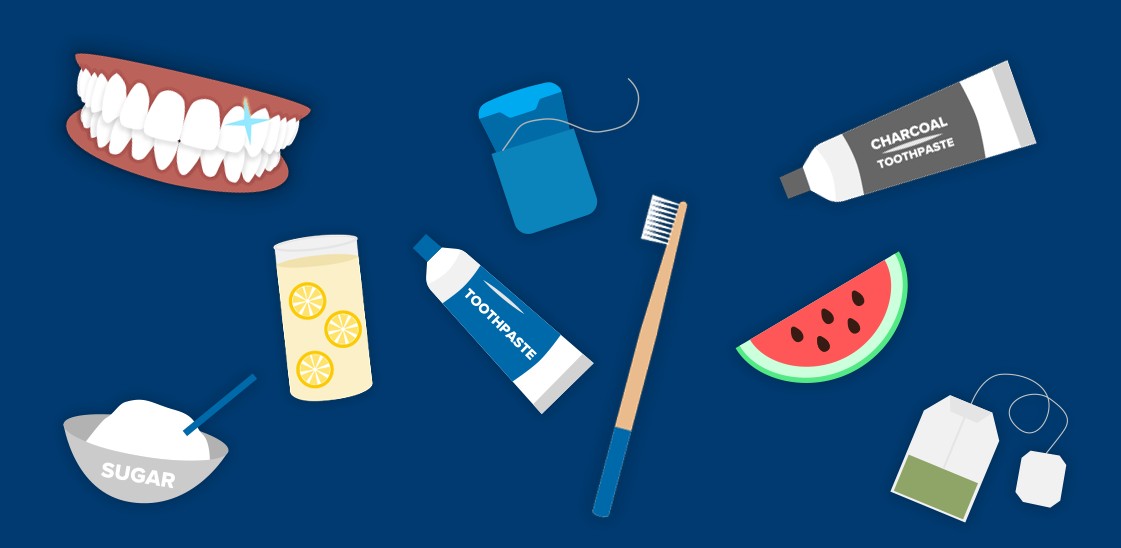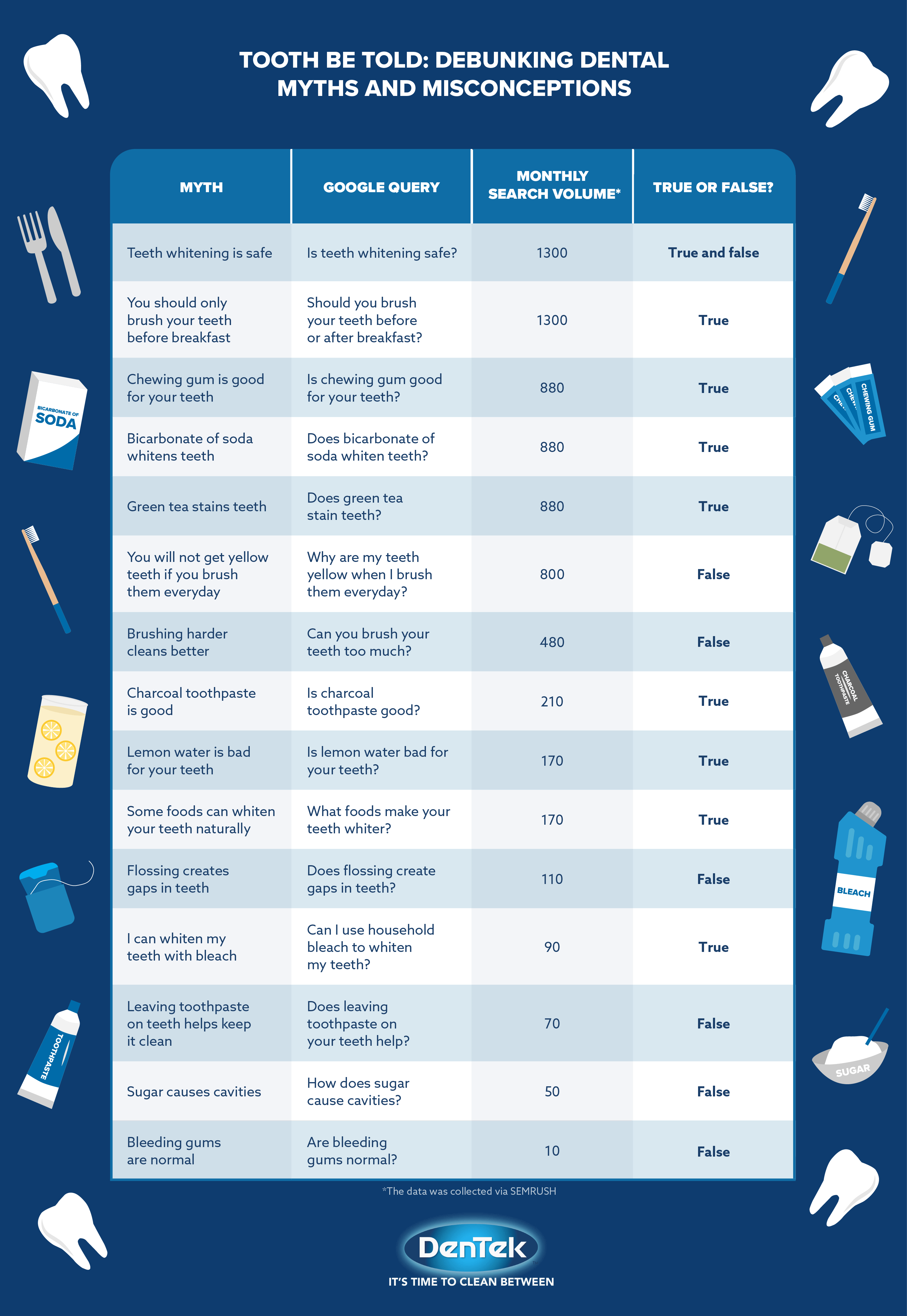
Tooth Be Told: Debunking Dental Myths and Misconceptions
There’s no denying that your oral health is paramount – but with so many different dental-related myths and misconceptions out there, sometimes it can be tricky to know what you should and shouldn’t do when it comes to looking after your teeth and gums.
Here at DenTek, as part of our latest campaign, we’ve created a table of the 15 most popular Google searches to see exactly what answers people are looking for in terms of their dental wellbeing. And since you can’t believe everything you read on the internet, we’ve taken a closer look at the top four dental myths to help you debunk them once and for all. 
The truth about teeth whitening
These days, there is a popular desire for brighter, whiter teeth more than ever before. Many people yearn for the picture perfect smile, believing that teeth whitening is the solution to achieving a gorgeously gleaming set of pearly whites. However, while some people swear by teeth whitening home kits and salon treatments, they are actually not safe – and here’s why.
It’s important to note that teeth whitening is a form of dentistry that should only be carried out by a registered dental professional. This means that even if you opt for a whitening treatment at a beauty salon and there is not a dental professional present to carry out the procedure, it is actually illegal, and you could be seriously putting your oral health at risk.
When carried out by a dental professional, teeth whitening involves taking an impression of your teeth to make a bespoke mouthguard. Many home whitening kits supply a mouthguard like this, but since it has not been made to fit your mouth properly, there is a risk that some of the bleaching gel could leak out. If this happens and the gel comes into contact with your gums, it could cause them to blister and you could develop gum sensitivity.
It’s crucial that you don’t always believe what you see on social media too. Last year, a TikTok ‘hack’ went viral which saw one user claim that dipping a cotton bud in hydrogen peroxide solution and then rubbing it all over their teeth was a cheaper alternative to teeth whitening. The truth is, hydrogen peroxide is a highly dangerous solution, especially if it comes into contact with the skin, and if used on the teeth, it can seriously damage the enamel and increase sensitivity.
In a nutshell, teeth whitening is not safe – unless it is carried out by a registered professional. So, if you’re after a whiter, brighter smile, you should speak to your dentist. They will be able to advise if teeth whitening is right for you and what your options are.[1]
Brushing your teeth: before or after breakfast?
There’s no doubt that you’re already aware of the importance of brushing your teeth twice a day, and it’s likely that you’re in the habit of visiting the bathroom to pick up your toothbrush before you jump into bed in the evening, and in the morning when you wake up – but there is often some debate whether you should be tending to your teeth before or after breakfast. While some people like to feel minty fresh after they’ve polished off their morning meal, some prefer to brush as soon as they pull back the duvet, but which one is best? Let’s take a closer look.
While you sleep, your mouth produces bacteria which multiplies. This is why you may often wake up with an unpleasant, stale taste in your mouth, and it can usually be to blame for your dreaded “morning breath”. So, reaching for your toothbrush soon after waking up and before you head to the kitchen can help wash out these nasties, providing your teeth with a protective barrier against the acid in your food. It’s also thought that brushing prior to breakfast can also help encourage saliva production, which in turn helps with the breakdown of food, as well as getting rid of harmful bacteria in your mouth.
Of course, if you prefer to brush after breakfast, you can continue to do so, but it’s important to note what this might mean for your dental health. Choosing to brush once you’ve eaten could actually coat them with acidic residue which can weaken the enamel, especially if you’ve sipped on fruit juice or indulged in foods such as bread and pastries.
While it’s up to you if you brush your teeth before or after breakfast, it seems that freshening up first is best for your oral health. That being said, if you’d prefer to brush once you’ve eaten, you may want to wait 30 minutes to an hour to ensure your teeth are as protected as possible.[2]
Is chewing gum actually good for your teeth?
It is often thought that chewing on gum isn’t good for your teeth, with some even thinking that it is nothing more than a bad habit. But did you know that chewing gum can actually mean good things for your oral health?
In short, chewing gum is good for you – if it’s the right kind. Sugar-free varieties can be effective in helping prevent tooth decay, and it can also encourage saliva production which can help neutralise and wash away acid that forms in your mouth after the breakdown of food. What’s more, the minerals produced by this extra saliva can also help strengthen the tooth enamel, reducing your risk of dental cavities.
Of course, not all chewing gums spell good news for your teeth. Sugary bubble gums can have the opposite effect in that it can contribute to the buildup of plaque on your teeth. So, when it comes to choosing gum, make sure you go for the sugarless variety to keep your oral health in tip-top condition.
It’s important to remember that chewing on gum is not a substitute for your regular oral care routine, so make sure you’re still brushing your teeth twice a day.[3]
Bicarbonate of soda whitens teeth
Bicarbonate of soda is a common household product that can be used in many different ways. It is often used in recipes for baking bread and cakes, and it can even be used to remove stains and odours. It can also be found in some toothpastes and teeth whitening products. But while bicarbonate of soda can be effective in whitening teeth, it’s important to understand that it can cause damage in the process.
Bicarbonate of soda is made up of a chemical compound which makes it have a mildly abrasive consistency, meaning that it can be effective in removing surface stains from your teeth and as a result, making them look whiter. However, if used continuously for long periods of time, it can cause serious damage to the enamel.[4]
Additionally, bicarbonate of soda does not contain the fluoride that’s needed to keep your teeth strong and free of cavities. In this case, you’ll still need to use a regular toothpaste to ensure your teeth stay strong and healthy.
Which other dental myths and misconceptions are actually true?
You may have heard that green tea can stain your teeth, leaving them looking dull and grey in colour. This is in fact true; green tea contains tannins which are organic substances that can stain your teeth and gums when consumed regularly.[5]
Charcoal toothpaste is good for your teeth but there is not enough evidence to suggest that it is good for whitening. It’s effective in removing and preventing stains, but using it on a daily basis can wear down the enamel.[6]
Lemon water has many benefits for the body, but did you know it’s bad for your teeth? When you drink lemon water, the acid level in your mouth rises and can lead to dental erosion.[7]
If you’ve heard you can whiten teeth with bleach then this is correct. However, it’s important to note that this is a special bleach used in teeth whitening products which are referred to as peroxide-based bleaching and should not be confused with regular household bleach.[1]
Which myths and misconceptions can you dismiss?
If you think brushing your teeth every day will prevent them from turning yellow, think again. Teeth can look more yellow as you age as the outer enamel begins to wear away. That being said, factors such as smoking or consuming certain foods and drinks can also be to blame.
Something else to bear in mind is that brushing your teeth harder does not clean better. In fact, doing this can lead to enamel wear and receding gums. Your gums can bleed from brushing and flossing teeth too hard. In fact, bleeding gums are not normal and can be a sign of an underlying problem such as gingivitis, diabetes, pregnancy, or certain medication.[4]
Although sugar can be a contributing factor to tooth decay, it’s not solely responsible for causing cavities. When carbohydrate debris left on your teeth from refined sugars, fruits, and vegetables, comes into contact with the bacteria living in your mouth, it produces plaque and causes cavities.[8]
Leaving toothpaste on your teeth can help keep them strong due to the strengthening properties of fluoride, but it doesn’t help keep them clean.[9] Meanwhile, flossing your teeth correctly does not create gaps and can help remove plaque and food debris that your toothbrush can’t reach.[10]

Which dental myths and misconceptions surprise you the most? Share your thoughts on all things teeth-related using the hashtag #ToothBeTold.
Resources:
[1] https://www.nhs.uk/conditions/teeth-whitening/
[2] https://www.nhsinform.scot/healthy-living/dental-health/your-teeth/teeth-cleaning-guide/
[3] https://www.dentalhealth.org/sugar-free-chewing-gum
[4] https://www.dentalhealth.org/sensitive-teeth
[5] Nordbo, H. “Discoloration of dental pellicle by tannic acid.” Acta odontologica Scandinavica vol. 35,6 (1977): 305-10. doi:10.3109/00016357709064129 Available at: https://pubmed.ncbi.nlm.nih.gov/271453/
[6] Tomás, Dolores Bibiana Montero et al. “Effectiveness and abrasiveness of activated charcoal as a whitening agent: A systematic review of in vitro studies.” Annals of anatomy = Anatomischer Anzeiger : official organ of the Anatomische Gesellschaft vol. 245 (2023): 151998. doi:10.1016/j.aanat.2022.151998 Available at: https://pubmed.ncbi.nlm.nih.gov/36183933/
[7] https://www.dentalhealth.org/dental-erosion
[8] https://www.nhs.uk/conditions/tooth-decay/
[9] https://www.nhs.uk/conditions/fluoride/
[10] https://www.nhs.uk/common-health-questions/dental-health/why-should-i-use-dental-floss/




